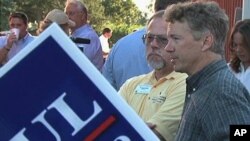Across the United States, the influence of the conservative Tea Party movement is changing the way candidates are reaching out to voters ahead of the midterm elections November 2.
In the state of Kentucky, at Reid's Orchard on the outskirts of Owensboro, the fire of a barbecue pit sends the smell of hamburgers and beans into the warm evening air.
Bringing candidates together
Free food and conversation draws voters from across the political spectrum to an election year tradition in this part of the country: the Red, White and Blue Picnic. One of the organizers of the event, Owensboro Chamber of Commerce President Jody Wassmer, says this is how they bring the voters and candidates together.
"This is a way that we bring the candidates out and let them meet the people," Wassmer says, "Good [old] fashioned political stump speeches. That is what we're all about."
Candidates running for offices ranging from local commission seats to the governor of Kentucky use the Red White and Blue Picnic as a platform to deliver their message directly to voters who will determine the outcome of midterm elections.
Kentucky, says Wassmer, has traditionally voted for Democratic candidates.
"It's a very conservative Democratic state, and the Republicans have made a lot of inroads here in recent years."
Voter anger
One such Republican is Senate candidate Rand Paul, who defeated a popular candidate supported by the national Republican Party in Kentucky's primary elections in May. He successfully tapped into voter anger over bank and auto industry bailouts, and an expansion of health care coverage.
He has the support of the Tea Party, which would like to see less government and lower taxes, something Paul says he strongly supports.
"I think a country grows by getting government out of the way," says Paul. "Government isn't the solution. Government needs to get out of the way to let private business thrive. Private business and industry is the solution," he says.
Palin influence
Paul's primary election victory in May, fueled by the endorsement of former Alaska governor Sarah Palin, reinforced the power of the Tea Party movement.
Across the United States, Tea Party support for senate candidates such as Christine O'Donnell in Delaware, Joe Miller in Alaska, and Sharon Engle in Nevada have changed the face of the Republican Party by defeating more mainstream candidates. But their victories have also raised questions about whether or not their message will appeal to a broader voter base in November general election.
Democrats are also looking at some of these candidates as a liability to the Republicans in their effort to regain a majority in the House of Representative and Senate on November 2.
Reshaping political system
Doug Schoen is the author of Mad as Hell: How the Tea Party Movement is Fundamentally Remaking our Two-Party System.
"While the Tea Party movement has, at this point, quite substantial disdain for the Democrats, it has almost equal disdain for the Republicans," Schoen said.
Even though Tea Party voters generally do not support incumbents, regardless of party, Schoen sees their influence helping the Republicans in November.
"I think it will be a pretty big victory this November and it is largely if not entirely being driven by the Tea Party movement, a movement that really 18, 19, 20 months ago, or certainly two years ago when President Obama was running, there was not a person in the world, certainly not in this town who was ever thinking that any movement like the Tea Party could come into existence, much less have the impact that it has," says Schoen.
Tea Party boost?
According to recent CNN-Time magazine poll of registered voters in Kentucky, Rand Paul is tied with his Democrat rival Jack Conway. Conway did not attend the Red White and Blue Picnic, but supporters campaigning on his behalf tried to paint Rand Paul as an extremist candidate unable to best represent Kentucky Voters.
But Jody Wassmer thinks Paul's support of business in Western Kentucky, and his opposition to environmental legislation commonly referred to as "Cap and Trade," may give him the edge in this part of the country come November.
"This is coal country, and we have a lot of low cost coal powered plants, and 'cap and trade' is aimed squarely at those plants," says Wassmer. "Businesses that are struggling through this economy don't want to see their rates go up, that's an issue Rand Paul comes down very well on."
Conway and Paul have agreed to three debates throughout October, which will give each of the candidates a chance to further reach out to voters in the weeks leading up to the midterm elections.
Conservative Tea Party Movement Shapes US Election Landscape




